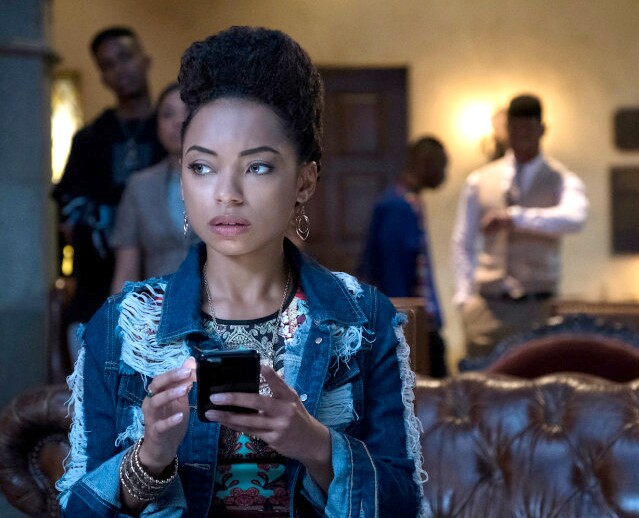“Dear White People” Season 2: The Inclusion Revolution Continues

Netflix’s Dear White People is currently at the forefront of an ongoing movement. A long overdue conversation is being had, and TV has been responsible for shining a light on some of its most important topics – in particular, equal representation. As I see it, the leaders of this modern-day inclusion revolution include the likes of Issa Rae, Donald Glover, Jerrod Carmichael and Justin Simien, the creator of the aforementioned Netflix series, among others. In the past, anyone who was any combination of non-straight and non-white and made it into the TV world was more than likely a token character, usually placed there by the powers that be so that they could say, “See? We’re inclusive!” In recent years that purpose has changed, from pandering to white guilt to telling the actual stories of the POC being represented. There have been many soldiers in this battle, but the heaviest hitters have been shows like Insecure, Atlanta, The Carmichael Show and, of course, Dear White People.
The last time I wrote about DWP I ended by saying “the world needs more of this.” Thankfully, the streaming gods agreed, and all the same players have returned for another season of passionate, intellectual conversations about self-identity, race relations, sex and relationships, family, friends and good old-fashioned messiness.
Season Two picks up almost exactly where we left off, just after the climactic events of the town hall protest. The format of the show remains the same, with each episode following a specific character’s journey, the amalgamation of which comprises a clear picture of the overall narrative.
Although the character work is pivotal (and obviously wasn’t taken lightly), it was the show’s ability to shift tones so organically based on which protagonists shared the limelight during any given episode that really impressed me. For example, Brooke (Courtney Sauls), who basically served as Lionel’s comic relief-providing nemesis last season, spends an entire episode running around with him trying to solve a campus mystery in an almost Scooby Doo-like manner. They were a fun pair with an entertaining dynamic, and I wanted more of it.
On the flipside, Troy’s episode followed his continuing journey for self-discovery, which like many of us eventually led to his doing shrooms. Given the weighty topics that usually serve as the focal point of his episodes (and everyone else’s), it was refreshing to see this one approached in a way that felt a bit lighter without removing any of the importance from the subject matter. His episode felt more like a classic college comedy and less like a serious character study. I loved it.
The real winning quality of this series is obvious: It’s the excellent writing. The conversation being had -- whether the topic is sexuality, race, abortion, whatever -- is never one-sided. Campus Free Speech is the vehicle through which some of these themes are tackled: Sam White (Logan Browning) has the right to make a pro-black radio show dubbed “Dear White People” in the same way that the campus Tomi Lahren-types have the right to a show of the same kind (i.e. “Dear Right People”). This creates a situation where, even though we may not agree with them, we’re forced to give the opposing side a chance to make their case. Otherwise we’re just preaching at them.
When I watch Dear White People I do try to consider how a white person would feel watching it. I mean, look at the show. White students are flooding Armstrong-Parker house, a primarily black dorm at the fictional Winchester University. Now they want more “white-friendly” menu options? Is this integration or gentrification? One could make an argument for both.
This raises even more questions. How do the people whom the overall narrative inherently disagrees with feel when they see this show? Is its message heavy-handed? Is it honest? Is it a look at the truths of the black experience, or is it just anti-white rhetoric wrapped in pro-black sentiments? Is that how it comes across? Most of the answers to the questions here are subjective, but I can say with a fair amount of certainty that exclusion is not and never was the plan here.
The truth is as follows: DWP is one of the few shows on TV that I can throw on and right away feel a sense of … belonging. I’m not watching someone else’s experiences. I mean, I am, but they’re experiences that I’m more than equipped to understand and relate to, because they could very easily be myexperiences. Hell, some of them aremy experiences. However, the ability to identify the similarities between the lives of these fictional people and my own doesn’t mean that those with different skin colors will have difficulty enjoying the show. DWP goes out of its way to argue both sides of every single argument, because like the campus free speech policy, this shit means nothing if it’s not for everybody.
So, what is the cherry on top of such an amazing second season? Why, it’s the cameo in the season finale by Tessa Thompson, who played Sam in the 2014 feature film that launched this franchise and turns up here as Rikki Carter, who’s basically (as Sam says) the Black Tomi Lahren. (Characters make references to Rikki throughout the season.) Eventually, Browning’s Sam ends up face-to-face with Thompson’s Rikki, a moment resulting in a monologue from Rikki that is, according to Sam, a “Dickensian mindfuck.”
Black conservatives are nothing new -- and using both your race andfree speech as part of a for-profit marketing scheme isn’t new either (see Kanye West). That said, seeing the actress who played Original Sam telling New Sam that she, Rikki, used to be just like her, and that ending up being a hypocrite who uses her passion for profit was inevitable was, well, straight up magic.
Season Two is chock full of stuff like that. Justin Simien is doing exactly what he needs to be doing: Making more of this for a world that needs it.
Click the social buttons above or below to share this content with your friends and colleagues.
The opinions and points of view expressed in this content are exclusively the views of the author and/or subject(s) and do not necessarily represent the views of MediaVillage.com/MyersBizNet, Inc. management or associated writers.


